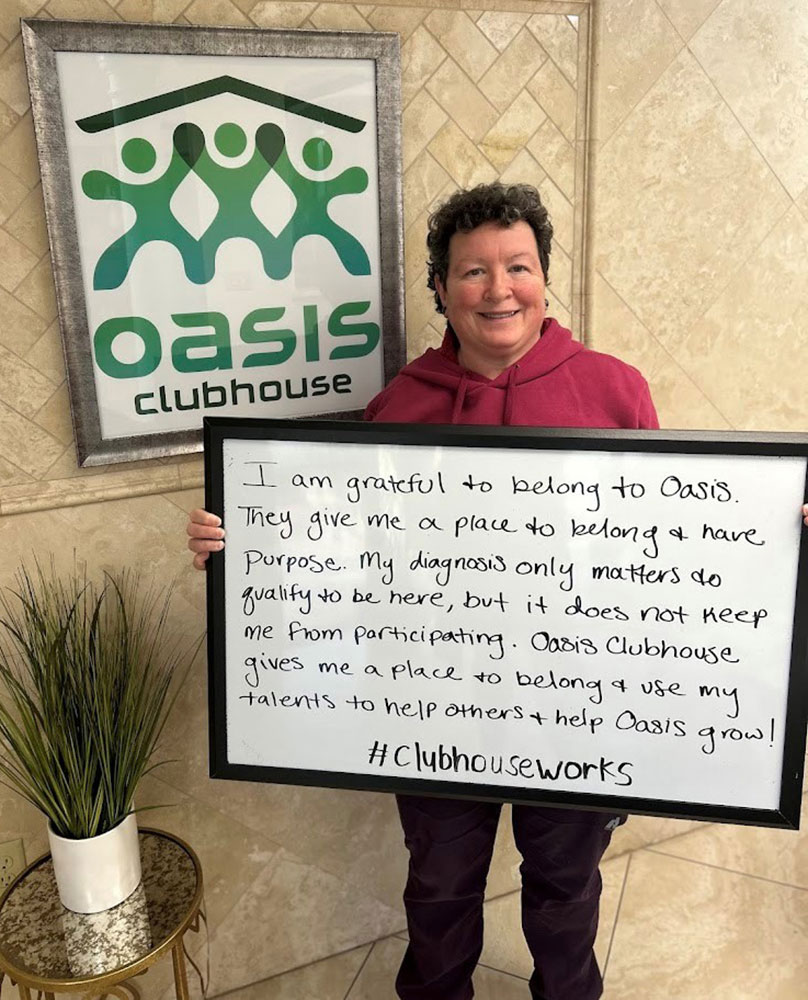
The Clubhouse love built
Oklahoma nonprofit helps adults with serious mental illness find community
When Sam Hewe’s wife, Amanda, was diagnosed with schizoaffective disorder and could no longer work, he, with the help of a dedicated set of likeminded individuals, built her a place where she and others could feel valued, engaged and supported: Oasis Clubhouse.
Having a mental illness can be isolating for individuals and families. Sam watched as Amanda, once a dietitian and medical school instructor, struggled. Over time, the life she had built began slipping away. Jobs became impossible to maintain. Social circles faded. Opportunities to engage with the world grew fewer and fewer.
The question Sam kept coming back to was simple but heartbreaking: What can be done to help Amanda and folks like her with chronic mental illness?
Through his work as president of the local chapter of the National Alliance on Mental Illness, Sam heard about the Clubhouse model, but there wasn’t a location close for Amanda. And so, Sam and a friend set about opening Oasis Clubhouse in Edmond, Okla.
The nonprofit, which opened its doors in October 2024 after a three-year effort, is part of Clubhouse International, a global network of more than 370 Clubhouses across 32 countries. Its community-based approach helps individuals with serious mental illness regain their independence, confidence and sense of belonging. The Clubhouse model focuses on people’s strengths, offering mutual support, vocational training, educational opportunities and structured socialization, alongside professional staff and is guided by a set of standards developed over the past 50 years. Members aren’t just recipients of care—they are active participants in a thriving community.
Providing a sense of purpose
Every day, members work side by side with staff to run the Clubhouse. Some take on administrative tasks, others help prepare and serve meals, while others contribute by maintaining the facility, assisting with outreach, or engaging in job training programs. The model is designed to restore dignity and self-worth by providing meaningful work, structure and connection. Decisions are made by consensus among members.
Amanda calls going to Oasis “going to work.” It’s a small phrase but a powerful one. It represents the return of purpose, responsibility and routine—things that mental illness so often strips away.

Sam also knows firsthand how Oasis helps caretakers and family members.
“It’s a tremendous relief,” he shared. “For the first 10 years after her diagnosis, I didn’t tell anybody. But now, knowing Amanda has a place where she’s supported, where she has a role, it’s freeing. I don’t have to be the only one anymore.”
A mission fueled by love and supported by community
For Sam, Oasis Clubhouse may have started as a deeply personal mission, but it quickly grew into something bigger. Committed to doing whatever it takes to make Oasis a reality, from finding a facility, hiring staff, painting the building, to building a snack bar and cooking a meal for the Clubhouse once a week, Sam knew he would need help. Along with a dedicated group of advocates, he assembled a board of directors to start fundraising. They secured crucial grant funding from the state, private donations and support from local businesses.
A significant backer has been BOK Financial®, where Sam works as a manager of petroleum engineering. His colleagues and company leadership have stood behind his mission, not just in words but in funds and action. Coworkers have volunteered time, attended events and contributed financially to ensure Oasis became a reality and continues to thrive.
“When we had our open house, almost everybody from my group at the bank showed up,” Sam said. “And they keep asking, ‘What can we do to help?’”
The state of Oklahoma also invested $100,000 per year for four years. It was a major breakthrough, as it was the first time they had supported a Clubhouse startup, and a testament to the value of the program, Sam said.
“Clubhouses like Oasis have a proven track record of cutting down incarcerations and police interventions,” Sam said. “It also cuts down on stays at mental health facilities because now these folks have a place where they belong. They’re wanted and needed. That community makes all the difference.”
Top-of-page photo: Board members, friends, and members of Oasis Clubhouse. Sam Hewes is pictured at the top left in glasses, and his wife Amanda, who has short, dark hair, is just to his right in the photo.